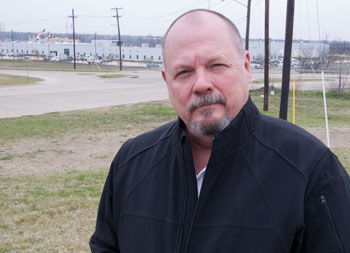A group of homeowners in the University West neighborhood are fighting mad over Chesapeake Energy’s use of an old Texas Railroad Commission rule to take the natural gas beneath their properties without paying them a penny.
Beyond that, the property owners claim, the giant gas company is trying to do it without providing them with the kind of notice required by law.
The issue has put the spotlight on two things that most folks in Fort Worth, up until now, didn’t know much about: Rule 37, approved by the Texas Railroad Commission 92 years ago as the agency’s first attempt to regulate gas and oil production in the state, and a local newspaper called the Commercial Recorder, which Chesapeake is now trying to use as its “paper of record” for publishing notices.
 “We’re not the first neighborhood to be hit with Rule 37 exemptions, but we are an unusual case because we’ve got several issues up in the air,” said Ben Proctor, whose dad owns one of the affected properties in the neighborhood north of Texas Christian University.
“We’re not the first neighborhood to be hit with Rule 37 exemptions, but we are an unusual case because we’ve got several issues up in the air,” said Ben Proctor, whose dad owns one of the affected properties in the neighborhood north of Texas Christian University.
Rule 37 requires a minimum distance between oil or gas well sites and also sets a minimum distance between a well and property for which the drilling company does not have a mineral rights lease. The intent is to protect owners from having their minerals taken by either an unscrupulous driller or by accident of proximity. The current distance a well bore must be from the edge of an unleased property is 330 feet.
Exceptions to the rule — allowing companies to drill closer to the property line — can be approved by the Railroad Commission under certain circumstances: if the drillers have given those owners a chance to voluntarily lease their land into a pooled drilling area at a fair price or if the driller can show that having to stay so far away from the unleased property will create a financial hardship for the company. To be considered for an exception, the gas or oil company must inform the affected land owners of the hearing, allowing them time to file a protest and be heard by the commission. The rule allows property owners to be informed by a notice published in a “newspaper of general distribution.”
Greg Hughes, one of the University West landowners, said that when Chesapeake began leasing mineral rights in the neighborhood several years ago, he and several neighbors decided not to sign.
“We were sent an offer for pooling [by Chesapeake], and that offer was a letter describing royalty interests and the risks involved,” he said. “But that letter was governed by a document which we could receive only if we agreed to the terms of the letter. So basically we were being offered a deal that we could only read in its entirety after we accepted it. And so to a person, everyone I know threw it away.”
In all, owners of 13 properties adjacent to the proposed drilling site turned down the mineral lease offer. Chesapeake obtained a permit to drill its well, but with the understanding that the company would not lay pipe, collect gas, or perform hydraulic fracturing at any point closer to those properties than 330 feet.
But then in July 2009, the property owners were mailed notices that Chesapeake had applied for a Rule 37 exception, asking for permission to bore within the 330-foot easement. “If that were granted,” said Hughes, a longtime community activist and former Fort Worth Transportation Authority board member, “they would be allowed to run their horizontal pipe right along our property lines, essentially allowing Chesapeake to collect our gas for free.”
The 13 owners filed notice with the commission that they intended to protest the exception, and Chesapeake withdrew its application. The residents thought that was the end of the issue, but it wasn’t. According to Proctor, a retired lawyer, “Within a week or so of withdrawing their application, Chesapeake refiled the same application for the exception. The problem was that we never received a notice of that hearing from the Railroad Commission.”
Without knowing that the second application had been filed, none of the University West homeowners protested. As a result, Proctor said, “the exception was administratively approved, and Chesapeake was given their permit and drilled the well alongside our properties.”
He and Hughes and the others didn’t find out about the developments until months later when the drilling of the well was covered in the neighborhood newsletter. “That was months after the well was drilled. And we never even noticed because the well pad was some distance away.”
The homeowners then filed a complaint with the Railroad Commission, saying they’d never been notified of the second Rule 37 request. At the hearing on their protest, in October 2010, the University West folks who attended were stunned when Chesapeake claimed that it had complied with the rule by publishing a notice in the Commercial Recorder. None of the group had ever heard of that paper.
“The Fort Worth Star-Telegram is where such notices are generally published,” said Proctor, “not some paper none of us had ever heard of or could easily find.”
The Commercial Recorder has been in business since 1903. Current owner Janet Ratcliff, daughter of founders Genevieve and Ben Ratcliff, said the paper publishes five times weekly and is filled mostly with estate and constable sales, warehouse sale notices, court dockets, death notices, and building permits. According to Ratcliff, circulation is about 5,000.
“We’ve been around longer than the Star-Telegram,” she said.
Longevity aside, publishing notices in a newspaper that few people know exists is not a normal way to do business, said Louis McBee, a long-time community activist who has studied the Rule 37 situation.
Ratcliff said her paper is available, among other places, in the Tim Curry Justice Center on West Belknap Street.
“The fact is that if you want to open a topless bar or do something else that requires you to publish a public notice and you want it buried, you publish it in the Commercial Recorder,” McBee said.
The guideline handed down by the state attorney general, McBee said, is that a newspaper must devote at least 25 percent of its space to general-interest stories to be considered a “newspaper of general distribution.” The Commercial Recorder, he said, averages considerably less than that.
Two Railroad Commission examiners working on different cases felt the same: In a case heard just two weeks ago, the examiner ruled that the Commercial Recorder did not meet the minimum requirements for a newspaper of general interest and so recommended that the Railroad Commission disallow the exception for Chesapeake. That case, called West Wing, involved an Arlington neighborhood that was never otherwise notified about the hearing.
However, the commissioners overruled their examiner and ruled that the Commercial Recorder did qualify as a newspaper of general interest and a valid place to post Rule 37 notices.
“Our examiner, a different examiner, also ruled that the paper did not qualify as sufficient public notice,” said Proctor, “but the Railroad Commission has not made their ruling in our case as yet.”
McBee said such tactics are “standard operating procedure for Chesapeake these days. Rather than trying to get those difficult leases signed, they just go to Austin and ask for a Rule 37 exception, then announce the hearing in the Commercial Recorder so that no one knows about it. And when no one protests the exception, it’s granted administratively, and then Chesapeake gets to drill right along the unleased property lines and capture those minerals without paying for them.”
A Chesapeake representative asked a reporter to e-mail questions for this story, but then failed to respond to the e-mail.
No date has been set yet for the next hearing on the University West case. Proctor and Hughes expect it to be heard later this month.
“The problem with our case in University West is that the well has already been drilled,” said Proctor. “So the ultimate question is, can a hearing, after the fact, cure a failure to have provided constitutionally required notice?”
Hughes said one remedy would be to have Chesapeake, before it begins fracking, plug the well at exactly 330 feet from all affected property lines. “Otherwise,” he said, “they may very well just take our minerals for nothing.”











